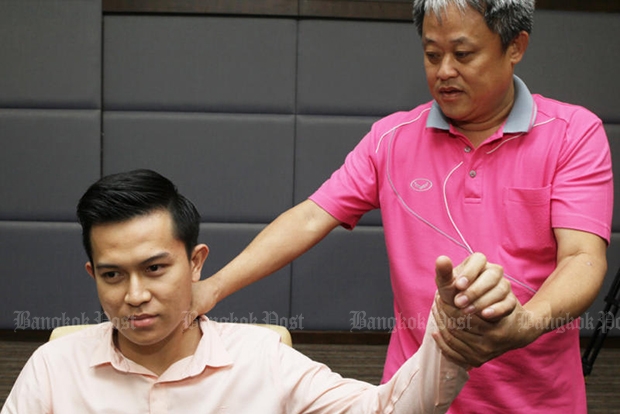
The "brain massage" neck compression technique, shown in a widely circulated video clip during which the patient fainted, is illegal and can cause sudden death, a specialist in Thai massage said.
It is claimed the technique can open up the mind.
Yongsak Tantipidok, a specialist in Thai massage for over 30 years, said the technique, in which the masseur presses two carotid arteries in the neck, is prohibited.
Mr Yongsak was commenting after a one-minute clip of a masseur demonstrating the technique went viral last week. In the clip, an elderly man fainted after his neck was pressed.
On Monday, the police arrested Wisutthichai Wandee, 39, the owner of a Pathum Thani massage shop who posted the video clip. The shop has since been closed.
Mr Yongsak said that despite the arrest, he was worried customers would still seek out the technique.
"All Thai massage textbooks clearly state the practitioner must avoid pressing the carotid sinus and carotid arteries which supply blood to the brain," Mr Youngsak said recently at the Ministry of Health's Department for Development of Thai Traditional and Alternative Medicine.
The carotid arteries, one on the right and the other on the left of the neck, are major blood vessels which supply the neck, face and brain.
A sudden lack of blood running to the brain can kill someone, he said. "These two blood vessels are crucial and sensitive to pressure," he added.
Arkhom Pradirsuwan, acting director of the Department of Health Service Support, said the masseur arrested by police faces a maximum jail term of three years and/or a fine of up to 6,000 baht under the Sanatorium Act if convicted.
The suspect would be charged with operating an illegal clinic and providing health care without a licence.
"The owners of massage shops must be accredited and licenced to provide the service. If the owner fails to comply with the regulation, they must face punishment,'' he said. A massage practitioner is required to complete at least 800 hours training and must be knowledgable of the human anatomy, he said.
Mr Yongsak said he hoped the news generated by the video clip and arrest would not affect the move to list Thai traditional massage as a cultural treasure with Unesco.
"We are have been with the Ministry of Culture for some time now and do not want the news to set back progress," he said. The department says 913 traditional clinics have registered nationwide.
